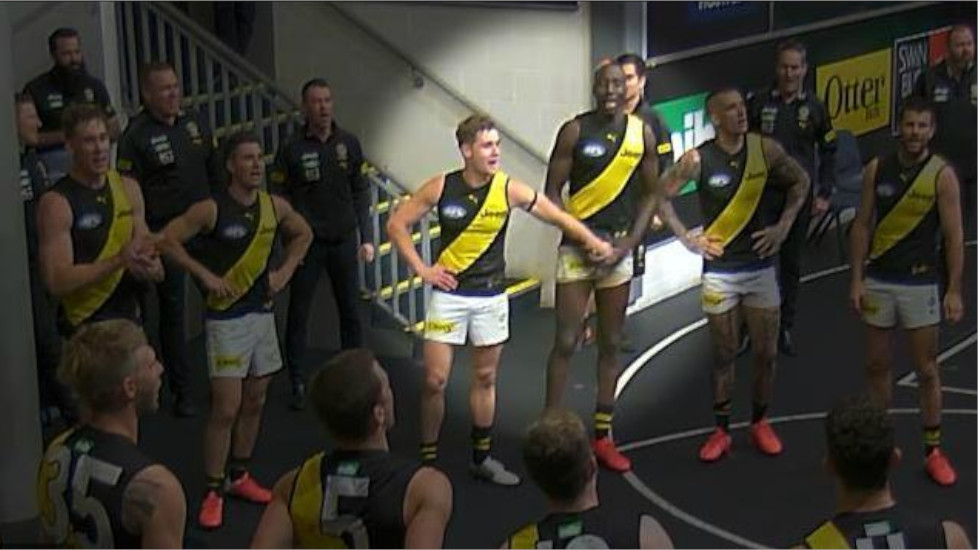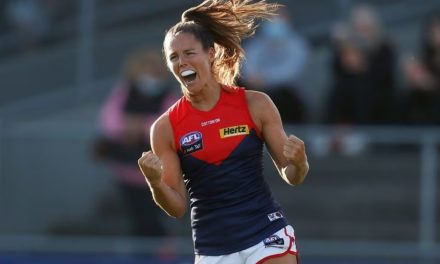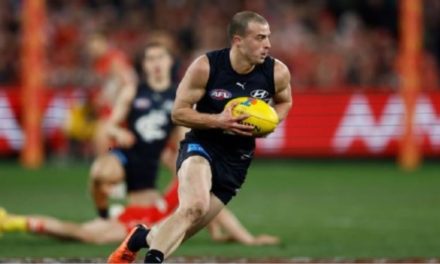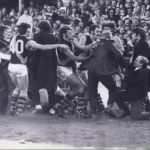Richmond youngster Mabior Chol gets the “treatment” from teammate Jayden Short. Picture: FOX FOOTY
This might not be the most delicate metaphor in the circumstances, but the game of AFL football really did get caught with its pants down last week.
The incident involving Richmond’s Mabior Chol and teammates Nick Vlastuin and Jayden Short was uncomfortable territory for the game for a variety of reasons. Primarily, though, because it exposed, not for the first time, the extent to which the game exists in a bubble too often completely at odds with the real world.
It all seems pretty obvious now several days down the track, even to those who live and breathe the code and its culture, that yes, a bloke should be able to stand with a group of teammates after a win, singing the club song, without having a finger thrust up his anus. No, he shouldn’t have to contend with the man standing next to him repeatedly attempting to slap his penis. And no, it’s not a good look.
But even that oft-used phrase “not a good look” gives some hint to the difficulty not just football, but all male sport, seems to have with genuine behavioural change as opposed to mouthing platitudes.
Forget the optics. In any typical workplace – as AFL football likes to consider itself these days – this could easily have been construed as a form of sexual assault. Not to mention bullying of a junior, more vulnerable cohort. And Chol’s Sudanese background also raised issues about racism and the sexualisation of black men.
That paragraph above is the point at which many people reading this article will either stop, scoff or roll their eyes. So if it makes you feel any better about what you might think comes across as a sermon, consider that instinctively, I probably had the same immediate reaction as you.
I’d been oblivious to what had gone on in the Richmond rooms until that now infamous press conference where Channel 10’s Hugh Riminton confronted coach Damien Hardwick with the issue. And if I’m honest with myself, my first response was the same as many crusty old veterans of the football industry: “Yeah, so what?”
Like them, I’ve grown up with this sort of stuff as a given. Tales of “exploits” involving players which, had they happened in an office or even on the street, would lead to them being at least arrested, and quite possibly charged with serious offences.
I can remember one of my football reporting colleagues in the 1980s returning from having interviewed one of the game’s superstars, regaling us all with one quote from the player lamenting the loss of “characters” from the game.
“It’s not the same anymore,” he said of the allegedly more professional environment of which he was now part. “You know, like the old days, when you’d be showering next to a bloke and have a piss on his leg, that sort of stuff.”
And that was small beans compared to some of the widely-shared anecdotes about the activities of players from this club or that on end-of-season trips, or even just after the games on a Saturday night, often stories involving young, intoxicated women and players in groups.
We’ve moved on. Correction. We’re supposed to have moved on. Yet anytime thorny societal issues involving alcohol, gambling, drug use, racism, sexism etc., etc. are raised in AFL football in a practical rather than theoretical sense, the muted, belated or even antagonistic responses speak volumes.
When Hardwick, preparing for an important game, was confronted by Riminton, his annoyed and dismissive response betrayed someone who thought the subject shouldn’t be broached. The about-face by both the coach and his club, which would soon release a statement in which Vlastuin and Short both apologised to Chol, was swift.
But was that response a realisation of completely inappropriate behaviour, or a recognition of damaging optics? It’s easy to reach the more cynical conclusion. Particularly when there’s plenty of supporters whose reactions to incidents like these will likely be determined by whether or not their team was involved.
On Footyology’s “Final Siren” post-game live Twitter stream last Friday night, my co-host Mark Fine and I attempted what we thought was a nuanced discussion of what had unfolded, one which didn’t lean particularly to one extreme or the other of the argument. We later posted a clip of the discussion on Twitter.
While many people had been appalled by what had taken place, a smaller amount thought the whole thing a gross overreaction. Perhaps not that remarkably, a large percentage of those just happened to be Tiger fans.
And it was allegiances rather than moral conviction which then just as likely drove the subsequent spate of videos and stills of players from other clubs doing exactly the same sort of stuff.
Indeed, there’s a defensiveness that seems to accompany many of the responses to societal issues which crop up in elite sport just as they do in other walks of life.
Take the Adam Goodes saga, for example, and the AFL’s slovenly response in supporting a champion of the game from the appalling and sustained attacks on his character until it was all too late. And the miserable revisionism in which many of those who attacked him indulged, perpetuating the myth that his treatment came not from his daring to speak up on issues of Indigenous welfare, but as a result of his staging for free kicks. Yeah, OK. “I’m not a racist, but …”
Or those around the game who might class themselves as strong advocates of mental health awareness, but can’t join the dots to consider the potential damage to the psyche of an individual whose circumstances don’t fit the typical examples thrown up in such discussions.
The thing is, awareness – of mental health, of bullying, of racism, whatever – doesn’t always need to be a punitive exercise, in which to concede ignorance or naivety is to face ostracism. But it does at least need to be an educational one.
And the Mabior Chol example is another good test. Football can genuinely learn from it. Or it can once again mouth some platitudes and forget all about it until life throws up another curve ball and the game, and those involved, instinctively reverts to type.
This article first appeared at ESPN.











